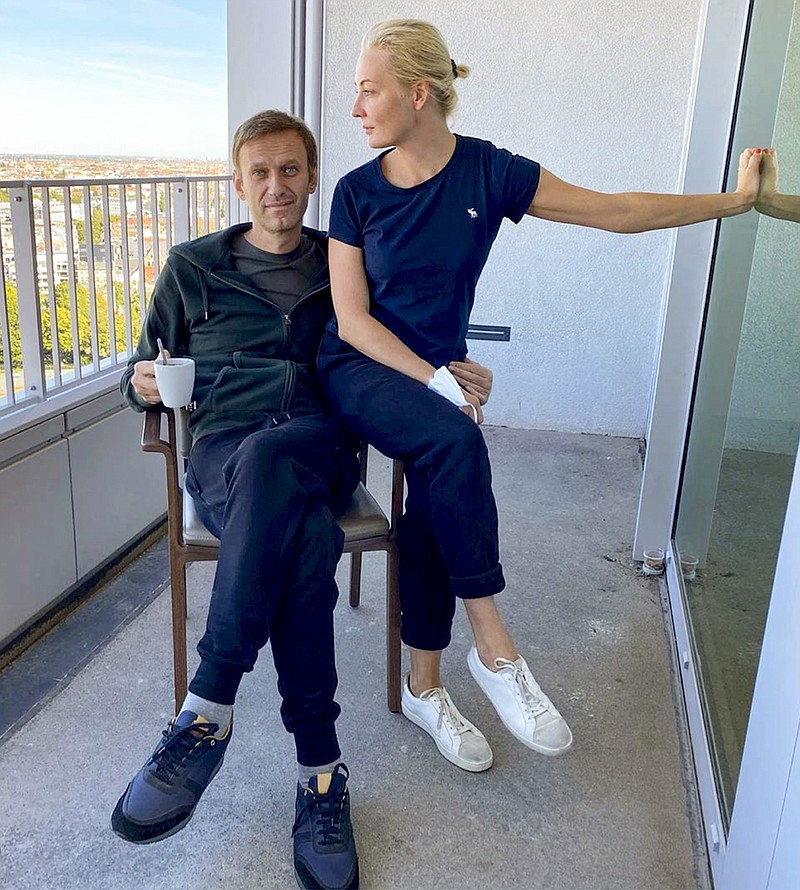BERLIN -- Russian opposition leader Alexei Navalny has been released from a Berlin hospital after more than a month's treatment for poisoning, with doctors now believing that it's possible he could have a "complete recovery" from the Soviet-era nerve agent, the hospital said Wednesday.
Navalny spent 32 days at Berlin's Charite hospital, 24 of them in intensive care, before doctors deemed his "condition had improved sufficiently for him to be discharged from acute inpatient care." He will remain in Germany for the time being to continue his rehabilitation, his team said.
Navalny, a politician and corruption investigator who is Putin's most visible opponent, was flown to Germany two days after falling ill on Aug. 20 on a domestic flight in Russia. He spent those two days in a coma in a hospital in the Siberian city of Omsk, where Russian doctors said they found no trace of any poisoning.
German chemical-weapons experts have determined that he was poisoned with the Soviet-era nerve agent novichok -- findings corroborated by labs in France and Sweden.
[Video not showing up above? Click here to view » https://www.youtube.com/watch?v=QcQV802LZes]
Charite hospital said, based on Navalny's progress, physicians believe that a "complete recovery is possible," but added that it "remains too early to gauge the potential long-term effects of his severe poisoning."
Navalny, 44, has been posting regular photos recently of his convalescence at the hospital on Instagram, first showing him sitting up in his bed surrounded by his family, then up and about in the building.
In his post Tuesday night, he laughed off a report in the French newspaper Le Monde saying that Putin suggested to French President Emmanuel Macron in a call that Navalny "could have taken the poison himself."
"Good theory, I believe it deserves the most careful attention," Navalny wrote in Russian. "Cooked novichok in the kitchen. Took a sip from a flask on the plane. Fell into a coma."
He wryly wrote that the "ultimate aim of my cunning plan" must have been to die in Siberia, where the cause of death would be "lived long enough."
"But Putin outmaneuvered me. You can't fool him," Navalny wrote. "As a result, I lay in coma for 18 days like a fool, but didn't get my way. The provocation failed!"
Kremlin spokesman Dmitry Peskov said Wednesday that the report about Putin's conversation with Macron was "inaccurate in its reported wording," but refused to elaborate as to which part was inaccurate. Macron's office refused to comment on the report.
The nerve agent used in the attack was the same class of Soviet-era poison that Britain said was used on former Russian spy Sergei Skripal and his daughter in Salisbury, England, in 2018. German Chancellor Angela Merkel has called the poisoning an attempted murder and she and other world leaders have demanded that Russia fully investigate the case.
Navalny was kept in an induced coma for more than two weeks as he was treated with an antidote. Members of his team accused the Kremlin of involvement in the poisoning, charges that Russian officials have vehemently denied.
Russia has bristled at the demands for an investigation, saying that Germany needs to share medical data in the case or compare notes with Russian doctors. Germany has noted that Russian doctors have their own samples from Navalny since he was in their care for 48 hours.
Germany also has enlisted the Hague-based Organization for the Prohibition of Chemical Weapons for technical assistance. The agency has collected independent samples from Navalny for testing but results have not yet been announced.
Information for this article was contributed by Angela Charlton of The Associated Press.







